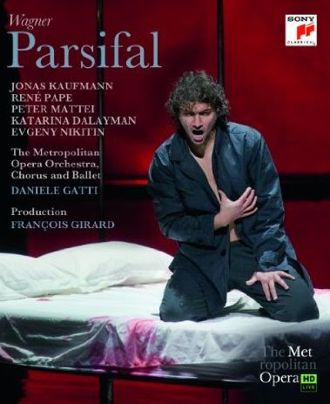|
|
|
|
|
|
|
|
|
The Bay Area Reporter, 08/21/2014 |
| by Tim Pfaff |
|
|
|
Parsiphallic or Parsifallible? |
|
| |
 Almost
since it first "consecrated" the stage at the Bayreuth Festival
in 1882, Wagner's Parsifal has been thought by many to bear
homosexual themes concealed in Christian trappings. Lawrence
Dreyfus, the best and deepest commentator about eroticism in
Wagner (and who argues from musical as well as literary
evidence), traces the homosexual subculture drawn to the work
from its early days, when one commentator called its view of
sexual deviance "Parsiphallic." Almost
since it first "consecrated" the stage at the Bayreuth Festival
in 1882, Wagner's Parsifal has been thought by many to bear
homosexual themes concealed in Christian trappings. Lawrence
Dreyfus, the best and deepest commentator about eroticism in
Wagner (and who argues from musical as well as literary
evidence), traces the homosexual subculture drawn to the work
from its early days, when one commentator called its view of
sexual deviance "Parsiphallic."
No one, least of all
Dreyfus, is arguing that Wagner may have been gay. But in Wagner
and the Erotic Impulse he writes, "However one judges the
strange menagerie of literary themes that inhabit Parsifal , it
is undeniable that Wagner is still portraying the intoxicating
allure of sexual desire, while seeking a solution to the
syndrome of exotic suffering." Sound familiar?
Against
all odds, there's scarcely a whiff of same-sexuality in any of
the three new DVD recordings of Parsifal, though two of them
clearly get the sex deal. The thing to which they all attest is
the degree to which the opera is, whatever transpires onstage,
the supreme "conductor's opera."
The interest in
Christian Thielemann's 2013 Salzburg Easter Festival production
(DG) is almost confined to the pit.......
Francois Girard's production for the Metropolitan Opera
(Sony Classical) is hardly traditional, and runs with rivers of
blood, much of it seemingly menstrual, but it's coherent and
focuses on the very real human drama. Parsifal is such an
elusive work that there hasn't, until now, been a recording
that's satisfying front to back, top to bottom. But here's a
performance that rises to every aspect of the complex work,
moves confidently and surely through the belief-confounding
terrain, and richly rewards repeated viewings. Parsifal wants
the spell cast in its astonishing prelude never to be broken,
and here it is not.
With his Tristan still in the offing,
it's safe to say that Jonas Kaufmann's Parsifal is his most
complete realization of a role to date. Successful passage from
pure fool to sex-scorched knight to supreme healer is granted to
few tenors, but Kaufmann illuminates the role in all its
dimensions and seems with his every move and breath to be
exploring new, deeper ones. Amazingly, he's cast with a Kundry
of similar powers. Katarina Dalayman tirelessly and generously
stretches her artistry, complete itself, as much and as
superbly.
The cast, with Rene Pape magisterial as
Guremanz, Peter Mattei a wrenching Amfortas, and Evgeny Nikitin
as Klingsor, is the best that could be assembled today, and all
deliver as if theirs were the holiest of missions. Still, as
this recording of the final performance (telecast
internationally) attests, conductor Daniele Gatti stole the
show. To do that in a house where James Levine "owned" the score
was an act of enormous daring triumphantly achieved. Over the
run, four of whose performance were broadcast live, Gatti
gradually yielded his finely chiseled reading of the score to
the surpassing gifts of his cast and players. Even at its most
masterful, I couldn't help thinking his conducting – famously
from memory – somewhat self-regarding.
The first thing I
noticed in the 2011 Parsifal (Bel-Air Classiques) from Belgium's
Monnaie theater ...
|
|
|
|
|
|
|
|
|
|
|
|
|
|
|
|
|
|
|